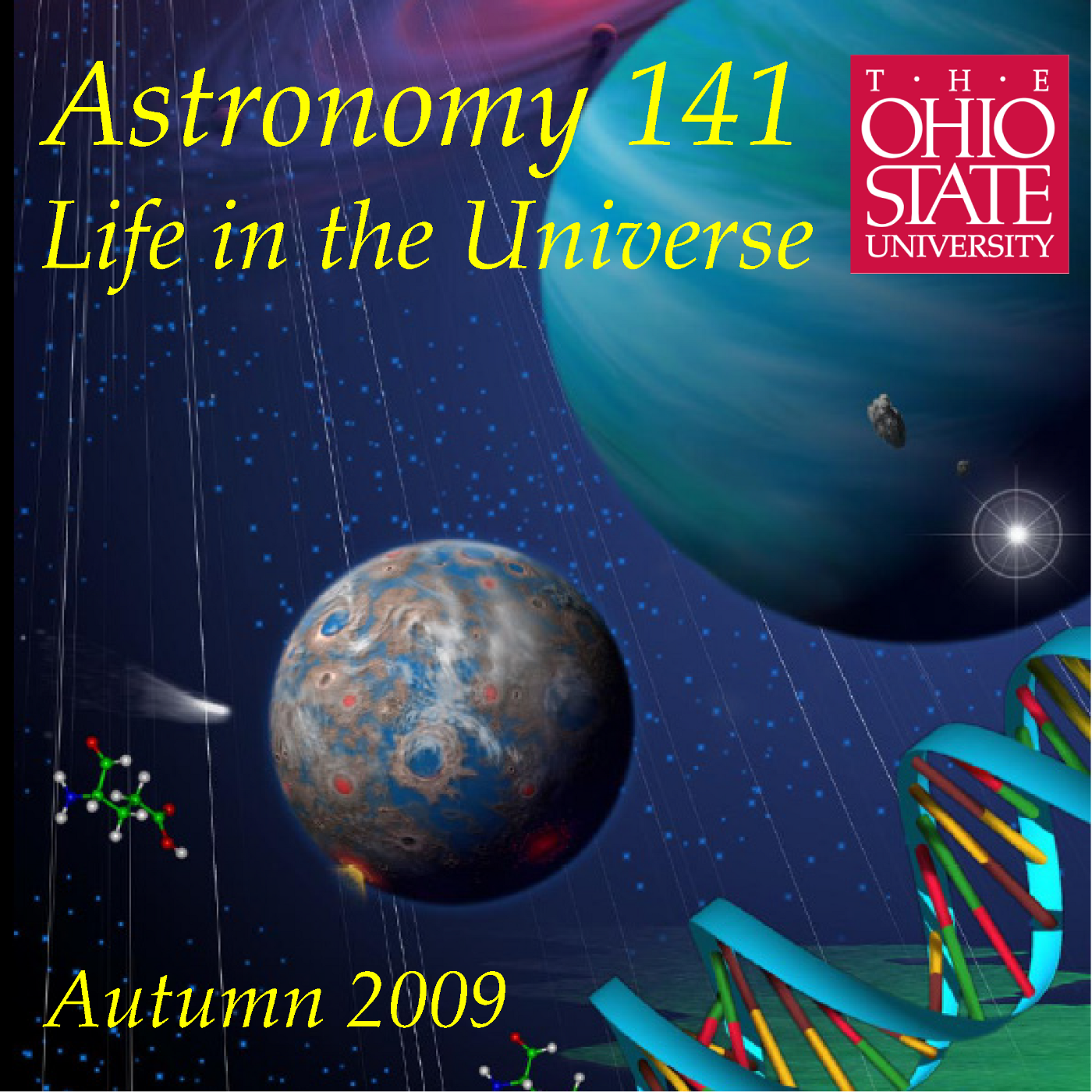Podcast Profile: Astronomy 141 - Life in the Universe - Autumn Quarter 2009
 Site • RSS • Apple Podcasts
Site • RSS • Apple Podcasts47 episodes
2009
Median: 46 minutes
Collection: Physics, Math, and Astronomy

 Site • RSS • Apple Podcasts
Site • RSS • Apple PodcastsDescription (podcaster-provided):
Astronomy 141, Life in the Universe, is a one-quarter introduction toThemes and summary (AI-generated based on podcaster-provided show and episode descriptions):
➤ Astrobiology overview • scientific revolutions shaping astronomy/biology/geology/chemistry • Earth history, climate, and early life • origin of life, evolution, extremophiles • Solar System habitability: Mars, Europa, Titan/Enceladus • stars, exoplanets, biomarkers • Drake Equation, SETI, Fermi Paradox • future of life in Solar System and cosmosThis podcast presents live lecture recordings from an Ohio State University introductory course in astrobiology designed for non-science majors. Across the series, the content builds a scientific framework for investigating “life in the universe,” starting with the basic tools and ideas needed to reason about planets, stars, time, and matter at astronomical scales.
Early lectures establish core literacy in scientific measurement and the historical development of modern science, using major “revolutions” in astronomy, chemistry, geology, biology, and cosmology to show how evidence-based models replaced earlier explanations. Listeners are introduced to concepts such as spectroscopy and radioactivity, deep time and radiometric dating, the age and structure of Earth, and how cosmology situates Earth in a universe with a measurable history and origin of elements.
A substantial portion focuses on life as a physical and chemical phenomenon. The lectures examine how biologists define life, how cells work, the biochemical requirements for metabolism, the role of water, and the function of DNA/RNA in heredity and evolution. The course also surveys extremophiles to map environmental limits of life, then turns to the earliest evidence for life in the geological record and current hypotheses for abiogenesis, including experimental approaches and competing origin scenarios. Earth’s long biological and atmospheric history is treated alongside planetary hazards such as impacts and mass extinctions.
The latter part shifts outward to evaluating habitability in the solar system and beyond. Topics include comparative planetology of rocky worlds, the giant planets and their moons, Mars exploration and life-detection controversies, and ocean-world candidates such as Europa and Enceladus, as well as Titan’s unusual atmosphere and hydrocarbon lakes. Habitability is framed through energy sources, atmospheric evolution, greenhouse effects, and the concept of habitable zones, including how they change over time.
Finally, the podcast broadens to stars and exoplanets, covering stellar properties and lifetimes, planet-detection methods, observed exoplanet diversity, and strategies for identifying Earth-like worlds and possible atmospheric biosignatures. It also addresses the Drake Equation, SETI, the physics of interstellar travel, the Fermi Paradox, ideas about what extraterrestrial life might be like (including alternative biochemistries), and long-term prospects for life as stars and the universe evolve.
| Episodes: |
|
Welcome to Astronomy 141 2009-Sep-23 |
|
Lecture 1: Introduction 2009-Sep-23 19 minutes |
|
Lecture 2: Astronomical Numbers 2009-Sep-24 43 minutes |
|
Lecture 3: Imagining Other Worlds 2009-Sep-25 40 minutes |
|
Lecture 4: The Copernican Revolution 2009-Sep-28 43 minutes |
|
Lecture 5: The Chemical Revolution and the Nature of Matter 2009-Sep-29 45 minutes |
|
Lecture 6: The Geological Revolution - Deep Time and the Age of the Earth 2009-Sep-30 46 minutes |
|
Lecture 7: The Biological Revolution - What is Life? 2009-Oct-01 44 minutes |
|
Lecture 8: The Cosmological Revolution - The Depths of Space and Time 2009-Oct-02 46 minutes |
|
Lecture 9: Inside the Earth 2009-Oct-05 42 minutes |
|
Lecture 10: The Earth's Atmosphere Erratum 2009-Oct-06 1 minute |
|
Lecture 11: The History of the Earth 2009-Oct-07 42 minutes |
|
Lecture 12: Climate Regulation and Climate Change 2009-Oct-08 45 minutes |
|
Lecture 13: What is Life? 2009-Oct-12 46 minutes |
|
Lecture 14: Cells 2009-Oct-13 45 minutes |
|
Lecture 15: The Chemistry of Life 2009-Oct-14 45 minutes |
|
Lecture 16: DNA and Heredity 2009-Oct-15 46 minutes |
|
Lecture 17: Life on the Edge 2009-Oct-16 46 minutes |
|
Lecture 18: The First Living Things on Earth 2009-Oct-19 46 minutes |
|
Lecture 19: The Origin of Life on Earth 2009-Oct-20 46 minutes |
|
Lecture 20: The History of Life on Earth 2009-Oct-21 47 minutes |
|
Lecture 21: Impacts and Extinction 2009-Oct-22 46 minutes |
|
Lecture 22: The Family of the Sun 2009-Oct-26 46 minutes |
|
Lecture 23: Terrestrial Worlds in Comparison 2009-Oct-27 46 minutes |
|
Lecture 24: The Jovian Planets 2009-Oct-28 47 minutes |
|
Lecture 25: The Requirements for Life in the Solar System 2009-Oct-29 47 minutes |
|
Lecture 26: The Deserts of Mars 2009-Oct-30 47 minutes |
|
Lecture 27: Is There Life on Mars? 2009-Nov-02 47 minutes |
|
Lecture 28: The Galilean Moons of Jupiter 2009-Nov-03 44 minutes |
|
Lecture 29: The Children of Saturn 2009-Nov-04 46 minutes |
|
Lecture 30: Goldilocks and the Three Planets 2009-Nov-05 46 minutes |
|
Lecture 31: The Properties of Stars 2009-Nov-09 46 minutes |
|
Lecture 32: The Lives of Stars 2009-Nov-10 46 minutes |
|
Lecture 33: The Deaths of Stars 2009-Nov-12 47 minutes |
|
Lecture 34: Habitable Zones around Stars 2009-Nov-13 47 minutes |
|
Lecture 35: The Solar Neighborhood 2009-Nov-16 46 minutes |
|
Lecture 36: Exoplanets - Planets Around Other Stars 2009-Nov-17 47 minutes |
|
Lecture 37: Strange New Worlds 2009-Nov-18 46 minutes |
|
Lecture 38: The Pale Blue Dot - Seeking Other Earths 2009-Nov-19 44 minutes |
|
Lecture 39: The Drake Equation 2009-Nov-23 45 minutes |
|
Lecture 40: SETI - The Search for Extra-Terrestrial Intelligence 2009-Nov-24 46 minutes |
|
Lecture 41: Interstellar Travel and Colonization 2009-Nov-25 45 minutes |
|
Lecture 42: The Fermi Paradox 2009-Nov-30 44 minutes |
|
Lecture 43: Extraterrestrial Life 2009-Dec-01 45 minutes |
|
Lecture 44: The Future of Life in the Solar System 2009-Dec-02 55 minutes |
|
Lecture 45: The Future of Life in the Universe 2009-Dec-03 44 minutes |
|
Lecture 46: This View of Life (Course Finale) 2009-Dec-04 41 minutes |